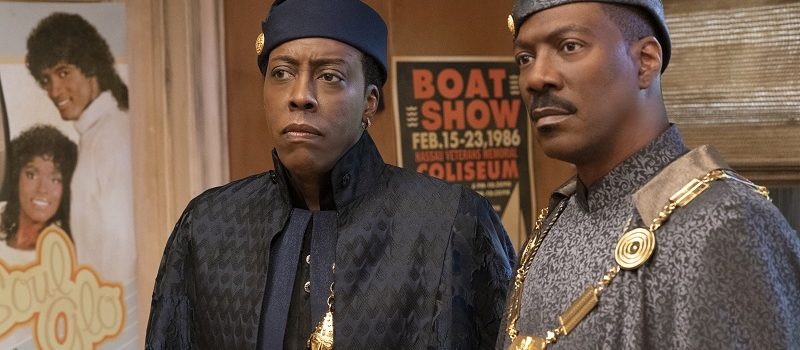The dynamic duo that helped make Coming to America an instant classic—Eddie Murphy and Arsenio Hall—are back for a sequel three decades in the making. Murphy and Hall sat down for a press conference to talk about Coming 2 America and took us behind the scenes and shared insight into the making of the highly anticipated sequel, which arrives on Amazon Prime on March 5.
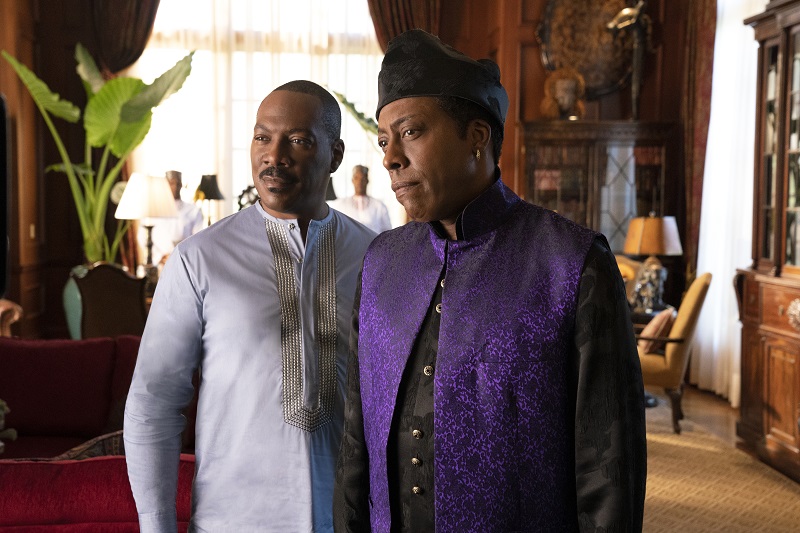
Murphy and Hall explore the legacy of the first film and how it took 30 years to make a sequel. In fact, Coming 2 America has only been truly worked on for the last half-decade, according to Murphy. The thing that pushed them over the finish line, turns out, was a writer whose work we guarantee you have adored at some point.
“It was maybe about three drafts of the script in we got it to where the structure and the narrative thread was strong enough to be like, ‘Okay, we have a movie here,’” Murphy recalled. “Now we just have to bring a young writer in and put that modern spin on it.”
Enter the in-demand writer of Black-ish, Grown-ish and 2017’s smash hit Girls Trip, Kenya Barris.
Coming 2 America has Murphy’s Prince Akeem returning to Queens, New York, with Hall’s Semmi in search of a male heir he never knew he had. The comedians may appear to have crafted a comedy about keeping male privilege alive and well. In fact, they have made a movie that looks at changing mores that should have been altered years prior.
Q: How does one connect a 30-year-old story to something that is relevant to today?
Eddie Murphy: We wanted to bring everybody back from the original. Me and Lisa (Shari Headley) went off happily ever after. So, it was like, okay, how do you connect the dots? [We thought] it would be funny if [Cleo] McDowell (John Amos) opened a McDowells in Africa. It was so that he could be there. It was like, “who would make the most sense and how can we connect the dots the best?” That’s how we picked who would be in the movie.
Q: How did it strike you to see all these people returning to these roles after 30 years?
Arsenio Hall: There was a night when Eddie did a scene with John Amos at the McDowell’s. It was the first time I walked into a room and saw John Amos and Louie Anderson. It was a real special feeling, especially for John. I mean, I love John. What John has done for black people in Hollywood when I was growing up, the dignity that he displayed as a man, I love him forever. Seeing him, really, it warmed my heart, as [co-star] Leslie (Jones) might say.
Q: Even the barbershop guys are back! Arsenio, how was sitting in that makeup chair this time around?
Arsenio Hall: It’s less abrasive to your skin these days. The chemicals are better, but it’s still four to six hours. My girl came to spend a week with me, and every morning she would have little chocolate boogers, little glue boogers all over her. Because even when they take it off, you have that stuff for two days, you’d be finding boogers. Little glue boogers.
Eddie Murphy: Don’t blame that on a makeup, man. You know you always be leaving glue boogers everywhere.
[Everybody laughs].
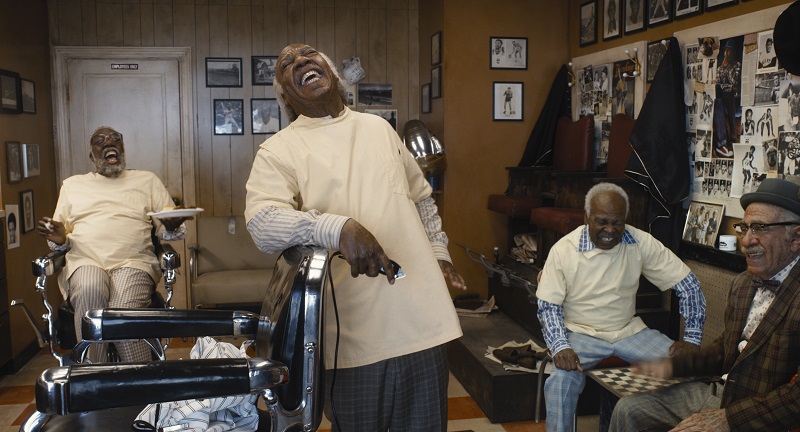
Q: Which character were you most excited to revisit of the characters behind all that makeup?
Arsenio Hall: I love when the preacher and Randy Watson are together in any situation. Mr. Murphy was going to do the Witch Doctor. You should let him tell you that story because there’s a history there.
Eddie Murphy: In the original, one of [us had] the idea. Originally, I was going to play the Witch Doctor and I was going to play Wesley’s (Snipes) character, the General [Izzi]. But then I started thinking about how long it would be to do these makeups. And I was like, “Witch Doctor is going to take six hours to do.” Arsenio was like, “I’ll do it.”
Q: How did that work out?
Eddie Murphy: So, we’re doing the movie. One night after everybody was leaving, he had that makeup on for six hours. It’s 4:30 in the morning and everybody’s leaving. [Arsenio’s] sitting in the makeup chair. He had a tissue. I said, “What’s wrong?” He said, “My eye is tearing.” But he was crying. He was crying at Tyler Perry Studios at 4:30 in the morning!
Arsenio Hall: By the way, there was a stop between me and Eddie doing the Witch Doctor. Eddie, tell him who wanted to do it at first.
Eddie Murphy: I think you were at one of Dave’s (Chappelle) shows. Right? Chappelle played Cleveland and Arsenio and Chris Rock was on the show and he told Dave, “Yeah, we’re a go and we’re doing Coming 2 America.” And Dave was like, “What? If you guys do Coming 2 America, I want to be in it.” Dave said he was going be in it, but then it didn’t work out because schedule and all that stuff. But he was going to play the Witch Doctor… for a sec!
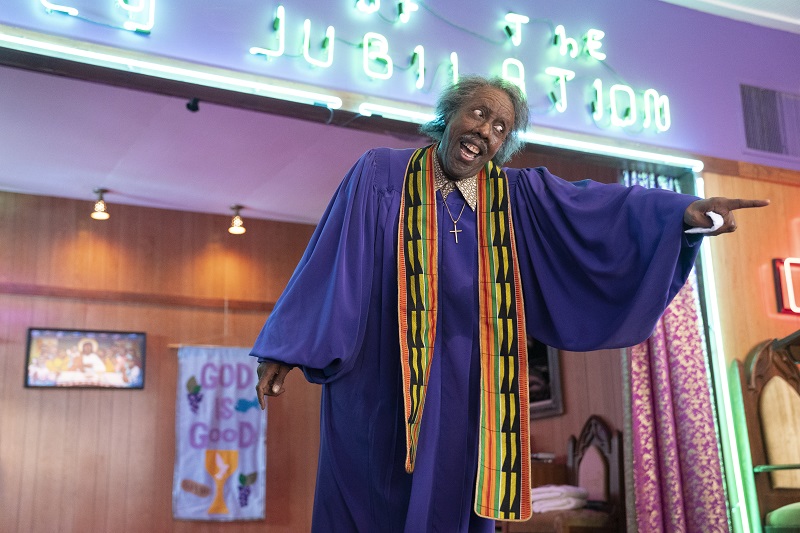
Arsenio Hall: The problem with him being the Witch Doctor is you wouldn’t have known it was Dave and it’s kind of getting Dave, but not getting Dave.
Eddie Murphy: You did a wonderful job as the Witch Doctor, Arsenio.
Q: Can you guys talk about the legacy of Coming to America. You can’t mention this film and not have people smile.
Eddie Murphy: The original Coming to America, the very first one is the first movie in the history of movies that had an all-black cast that was successful all around the world. There’s just a handful of movies that have had all black casts that have been successful all around the world. Actually, you could count them on one hand, and you’ll have fingers leftover! The legacy of this movie is that it’s accessible to all audiences.
Q: Specifically, how?
Eddie Murphy: It’s just about family, love, tradition, and doing the right thing. That’s what the movie is about. And it’s these amazing images of black Kings and Queens, and princesses, and all this stuff. Black Panther did it much later. The second movie that had black Kings and Queens was Black Panther. But the very first one is Coming to America and the third one is Coming 2 America.
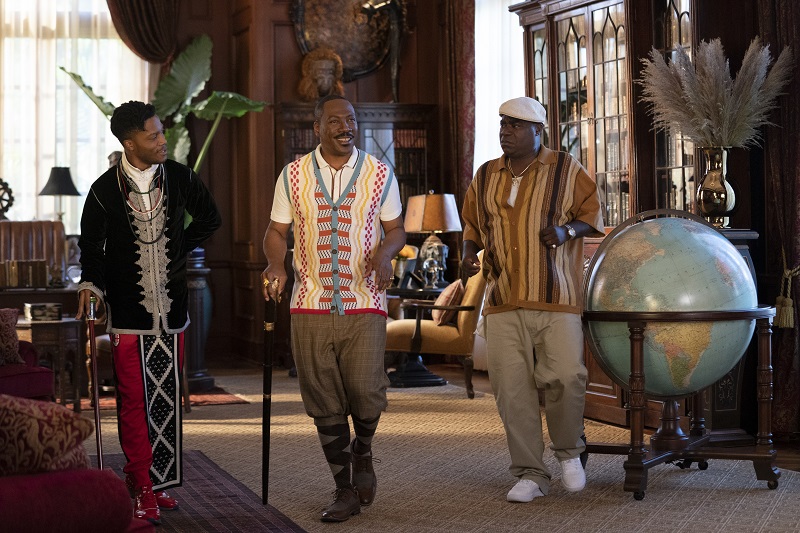
Q: Do you think that the idea of marrying for love, something that drove the first movie, is another reason it still touches folks?
Eddie Murphy: The themes are timeless. Marrying somebody for who you want to, who you really love. It’s a lot of stuff that’s in it. Fiddler on the Roof has a lot of stuff that’s similar images, and similar stuff is similar themes is Coming to America. If you tell a universal story, it can be universally adored.
Q: There are so many pop culture legendary moments from the first film. Do you have any favorites?
Eddie Murphy: Soul Glo! That’s just one aspect of one of the things that started out in Coming to America that’s in the culture now. You have that. Questlove has a band called the Randy Watson Experience. People say (expletive) like “sexual chocolate.” That became a catchphrase! The mic drop, the very first mic drop is Randy Watson!
Q: Casting stand-up comedians in the first movie, and now the sequel—such as SNL veteran Leslie Jones—does that help bring the humor with unpredictable improv?
Arsenio Hall: Leslie, she’s hilarious every moment. She is so funny. There were a lot of stand-ups on that movie and we’re on the Tyler Perry lot, which was magical that this brother created this. There were days, he has a buildup of the White House for shooting [The Oval]. There were days I’m standing with Tracy Morgan and Leslie in front of the White House on the Tyler Perry lot, laughing my ass off. It was the greatest experience. They didn’t have to pay me for this one because I had a great time.
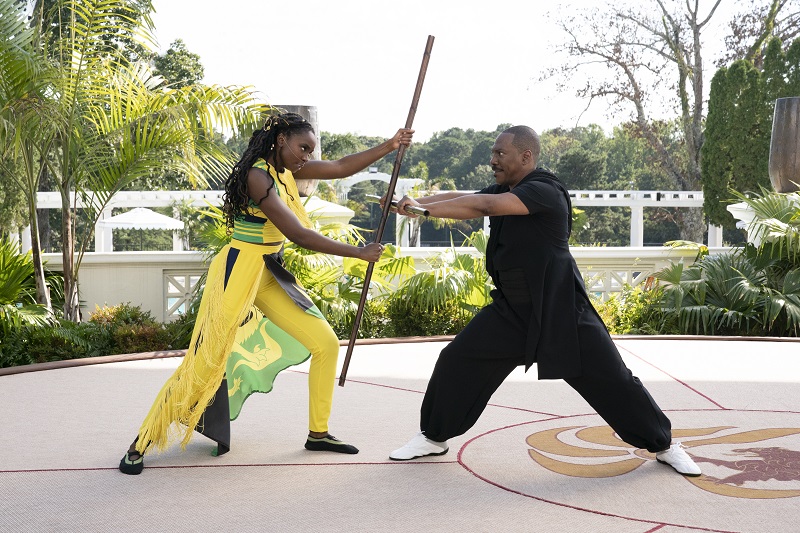
Q: What a lot of people think about when they think about this movie is not just the idea that you guys captured lightning in a bottle. But more importantly how it showed different aspects of African-American culture. What new things or messages are you excited for folks to see?
Arsenio Hall: I think the message of female empowerment. There’s no timing like the timing of G-d. And that message is so important and perfect for right this moment. I’m proud of the film in many ways like that. I was there at two in the morning watching Bella (Murphy… Eddie’s real-life daughter stars as Omma—Akeem’s older daughter) and Akiley Love (as Akeem’s younger daughter, Tinashe) beat people up. What it says about women is incredible.

